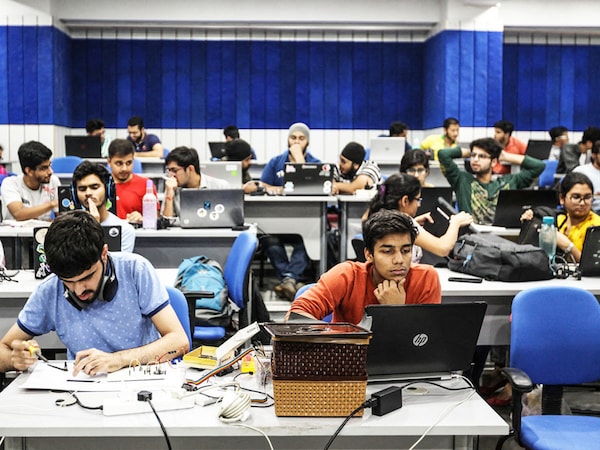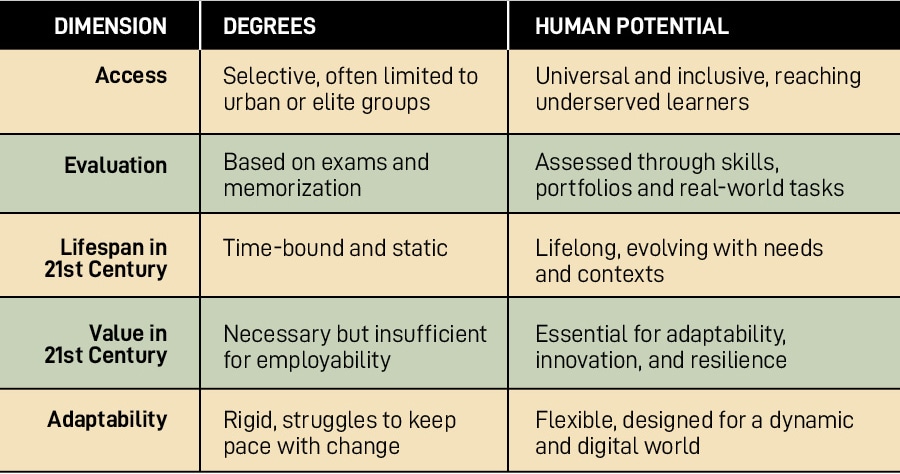The real returns on education: Why India must invest on human potential, not jus
Degrees matter, but they're not enough. India's future depends on how well it nurtures adaptable, real-world problem-solvers


India’s legacy of learning runs deep. From Vedic gurukuls to Nalanda and Takshashila, education was sacred: Rooted in inquiry, discipline, and public purpose. Learning wasn’t transactional, it was transformational.
That ethos shaped some of the world’s most influential thinkers. From Silicon Valley to the civil services, Indian-origin leaders have left their mark. But the model that powered their rise—content-heavy, exam-focussed learning—is losing relevance. In an age where technology can automate anything repeatable and AI takes on real-time decision-making, value lies in what machines and AI can’t mimic: Collaboration, adaptability, multi-disciplinary thinking and real-world problem-solving. Skills the current education system often sidelines.
Today, with over 800 million Indians under the age of 35, and nearly 59,000 higher education institutions, India stands at a defining moment. Degrees may signal progress, but the true return on education lies in how well we unlock human potential.
Education doesn’t just raise incomes it improves lives across generations. Each additional year of schooling boosts individual earnings by nearly 10 percent and national GDP by up to 18 percent. Girls with secondary education are three times less likely to marry early due to increased empowerment and knowledge. These are the real returns on investing in human potential.
Yet the system remains misaligned. Over 80 percent of Indian employers report difficulty finding skilled talent (Global Talent Shortage Survey, 2025 Manpower Group), even as most recruiters now prioritise skills over degrees, says the Unstop Talent Report 2025. At the same time, the Future of Jobs report estimates that 63 percentage of India’s workforce will need retraining by 2030.

Degrees alone no longer guarantee readiness for a changing world. They remain necessary, but increasingly serve as proxies, not proof, of potential.
India must reframe education as capacity-building. This shift can be seen clearly:
The National Education Policy (NEP) 2020 marks a critical shift toward this vision. It emphasises flexibility, multidisciplinary learning, and real-world readiness and positions education as a foundation for lifelong growth not just job entry.
A future-ready education system must be responsive. A one-size-fits-all approach no longer works. Teachers must be equipped to observe, adapt, and personalise learning academically, socially, and emotionally. India’s future lies in education that is competence-based, inclusive, and adaptable.
Some models are already showing what’s possible when innovation meets intent.
Tamil Nadu’s Naan Mudhalvan programme offers AI and EV manufacturing training through partnerships with Zoho and Hyundai. Kerala’s Additional Acquisition Program Skill (ASAP) equips women with digital and financial literacy tailored to local economic needs. Telangana’s TASK programme links students directly to industry partners like Microsoft and Amazon. Skill Meghalaya has trained over 30,000 youths, creating nearly 10,000 jobs in remote tribal areas.
To scale human potential, India must act on four strategic fronts:
India’s budget for education, skilling and employment has crossed ₹1.48 lakh crore. While innovative concessional financing mechanism such as International Finance Facility for Education can provide additional funding for human capital development, effectiveness matters in addition to scale and speed. Progress must be measured not by the number of degrees, but by lives empowered to think, solve, and lead. By 2047, as India aims to become a $10 trillion economy, it must invest in confident, capable citizens—not just graduates. Let’s stop counting credentials. Let’s start compounding human potential.
Karthik Krishnan is the CEO of International Finance Facility for Education
Dr Ruma Bhargava is Global Lead Mental Health, World Economic Forum, and Founder of Samarpann
Views are personal
First Published: Jun 18, 2025, 18:18
Subscribe Now